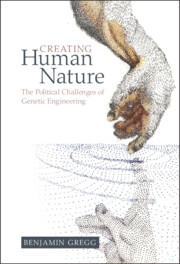Book contents
- Creating Human Nature
- Creating Human Nature
- Copyright page
- Dedication
- Contents
- Acknowledgments
- Introduction
- Part I The Political Bioethics of Regulating Genetic Engineering
- Part II The Political Dimensions of Engineering Intelligence
- Part III Inequality as an Unintended Consequence Locally and as a Planetary Phenomenon
- 8 A Human Right to Freedom from Genetic Disability
- 9 Deploying Epigenetics to Identify Biologically Influenced Social Inequalities
- 10 Genetic Engineering as a Technology of the Anthropocene
- Coda
- References
- Index
9 - Deploying Epigenetics to Identify Biologically Influenced Social Inequalities
from Part III - Inequality as an Unintended Consequence Locally and as a Planetary Phenomenon
Published online by Cambridge University Press: 13 October 2022
- Creating Human Nature
- Creating Human Nature
- Copyright page
- Dedication
- Contents
- Acknowledgments
- Introduction
- Part I The Political Bioethics of Regulating Genetic Engineering
- Part II The Political Dimensions of Engineering Intelligence
- Part III Inequality as an Unintended Consequence Locally and as a Planetary Phenomenon
- 8 A Human Right to Freedom from Genetic Disability
- 9 Deploying Epigenetics to Identify Biologically Influenced Social Inequalities
- 10 Genetic Engineering as a Technology of the Anthropocene
- Coda
- References
- Index
Summary
Research on human genetics reveals distinctly political dimensions, given the need for the modern state to regulate human reproduction through laws of hypodescent,1 that is, interventionist natalist policies that incentivize larger families,2 or eugenics.3 But if the natural world and the social world are sharply distinguished one from the other, justice is a matter solely of the social world, meaningless in the natural world. Thus if one’s genetic endowments are entirely a natural phenomenon, then whether one is fortunate or unfortunate in one’s genetic endowment is without moral significance. Rather, it is a matter of individual luck in the “genetic lottery” of nature. Political community has no obligation to address “losers” in the “genetic lottery” – unless one adopts, say, the standpoint of luck-egalitarianism or, alternatively, commits to consequentialism. Otherwise, “to say that something is due to nature” is to relegate it to the “realm of fortune or misfortune,” hence to reject the notion that it might fall within the sphere of justice (Buchanan et al. 2000: 83). In that case, “natural” disadvantages in the shape of genetically based health disparities among members of a community appear to be an inequality that is no one’s fault: a misfortune, certainly, but not an injustice. Corrections are then gratuitous acts of beneficence, voluntary acts of decency, but hardly moral, let alone legal, obligations.
- Type
- Chapter
- Information
- Creating Human NatureThe Political Challenges of Genetic Engineering, pp. 177 - 201Publisher: Cambridge University PressPrint publication year: 2022



